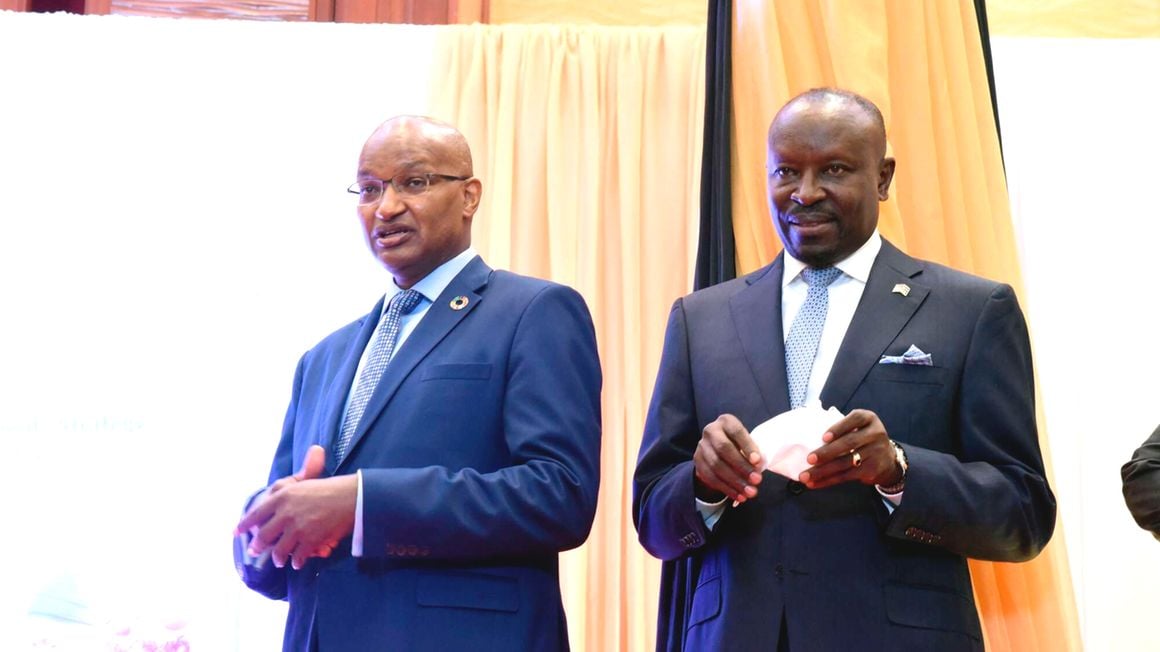
Central Bank of Kenya (CBK) Governor Patrick Njoroge (left) and CBK Chairman Mohammed Nyaoga during the launch of the National Payments Strategy 2022- 2025 at the Serena Hotel Nairobi, on February 23, 2022. PHOTO | DIANA NGILA | NMG
The Central Bank of Kenya (CBK) faces another headache in complying with the
law requiring staggered replacement of its directors as the terms of six of the seven board members come to an end.Two of the seven board members, Governor Patrick Njoroge and Chairman Mohammed Nyaoga will exit on June 17, marking the first round of the directors’ overhaul at the CBK.
The second round of the board shake-up will happen in December next year when the terms of four directors will end at once, highlighting the difficulty of complying with regulations requiring phased replacements.
Practised mainly in US corporate law, staggered boards are often used to prevent hostile takeovers and provide continuity through a smooth transition between incoming and outgoing members.
In Kenya, it is promoted as a corporate governance practice but entrenched in the CBK Act, which underlines the importance of board transition in the country’s most powerful regulator.
“The members of the board shall be appointed at different times so that the respective expiry dates of the members’ terms of office shall fall at different times,” says the Act.
The CBK has struggled to meet the requirement given the current four independent directors were hired on the same day and their tenures renewed on December 5, 2020 for the final four-year term.
The terms of the four members— Nelius Kariuki, Ravi Ruparel, Samson Cherutich and Rachel Dzombo— will lapse on December 6 next year.
Deputy Governor Sheila M’Mbijjewe will also be retiring from the CBK on June 17, leaving behind Dr Susan Koech who was hired on March 10, 2023, as the second deputy governor.
The hiring of the second deputy governor has corrected a legal breach that has been repeatedly raised by the Auditor-General.
The law enacted in 2015 demands that the executive team at the CBK be composed of the governor and two deputies.
Former President Uhuru Kenyatta ignored calls for the CBK to have two deputy governors for the better part of his 10-year tenure.
Also read: CBK freezes top banks' bid to increase borrowing rates
The appointment of the second CBK governor is also aimed at avoiding a leadership vacuum at the CBK in June should replacements for Dr Njoroge and Ms M’Mbijjewe be delayed beyond June 17.
The lack of a second substantive deputy governor has attracted the attention of the Office of the Auditor-General, which has pushed for the filling of the post or amendments to reduce the number of deputy governor posts.
The CBK has further been indicted over failure to maintain the required number of non-executive directors at eight, with only four for the better part of the eight years.
“Section 11(1) (d) of the CBK Act, Cap 491 of 2014, provides that there shall be eight other non-executive directors of the board. During the year under review (2021/22), the Bank had only four non-executive directors in place transacting business on its behalf,” Auditor-General Nancy Gathungu said in the latest audit report.
The CBK Act says that a quorum for any meeting of the board can be achieved with the chairperson, governor and three directors—a loophole that has allowed the entity to function without hiring the additional four members.
The only permanent member of the CBK board is the Treasury Cabinet Secretary. The position is held by Njuguna Njung’u, who was appointed in October last year, making him the current seventh member.
The CBK is among the few State agencies whose board appointments are made by the President and backed by Parliament.
The President taps the board chair, with the Cabinet Secretary hiring directors.
Under the CBK Act, the board is responsible for determining the policy of the bank, other than the formulation of monetary policy.
Read: The scorecard of CBK governor
The board is expected to meet at least once every two months to review the bank’s performance, approve capital expenditure as well as monitor management decisions.
The board is also expected to set up special committees to ensure the stability of the financial sector as a whole.
A staggered board is comprised of directors that have different overlapping, multi-year terms so that not all of their terms expire in the same year.
This setup is also referred to as a classified board of directors. For the CBK, this has been made difficult by the fixed terms of directors.
Analysts reckon that President William Ruto has a window to ease the legal breach by staggering the appointment of the extra four directors.
→ palushula@ke.nationmedia.com




No comments :
Post a Comment